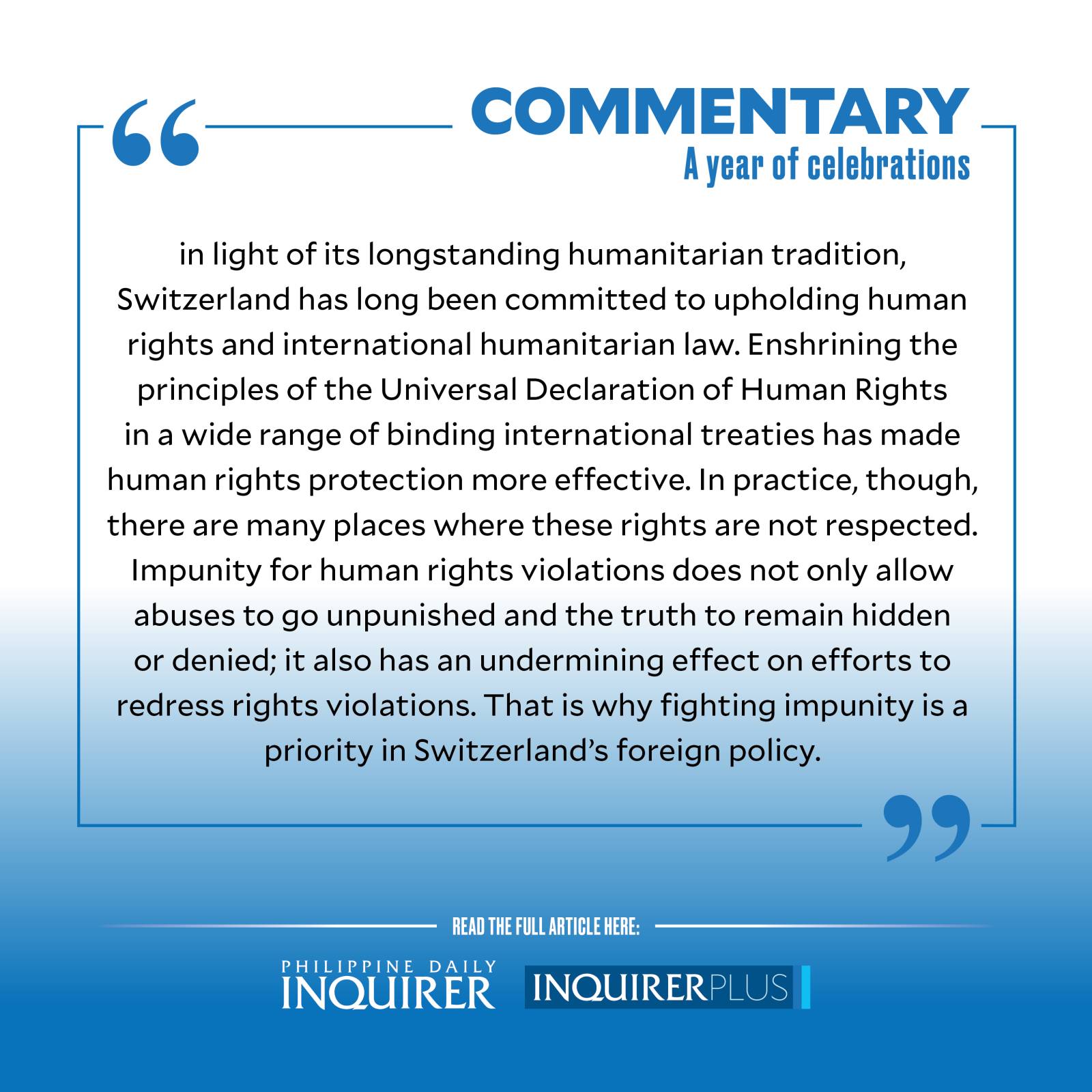
The year 2022 is coming to an end. And what a year it has been. We celebrated not just the anniversary of the diplomatic relations between the Philippines and Switzerland; on May 9, the Filipino people elected the sixth president of the Republic of the Philippines under the present Constitution. May 9 also coincides with the exact date of the establishment of diplomatic relations between our two countries.
On that date in 1957, the then Swiss envoy handed over the letter of credentials to the government. Elections and voting are part of the Swiss DNA, and thus there is no better way of celebrating our relations. As a matter of fact, Swiss citizens have many means to participate in the political decision-making process, and they can vote up to four times a year at the national level, and even more often at “cantonal” (provincial) and local levels.
The founders of the modern Swiss state recognized, over 170 years ago, that stability and prosperity can only be guaranteed through solidarity and a far-reaching involvement with the linguistic, regional, and cultural minorities, both in the political decision-making process and in all key positions of the state.
This year also coincides with Switzerland’s 20th anniversary of joining the United Nations. In March 2002, 58 percent of the people voted in favor of joining the United Nations (UN) in a national vote, making Switzerland the first (and only) country to join the UN by popular vote. Since then, Switzerland has asserted its position within the organization, both as a member state and as the host country to the UN’s European headquarters in Geneva. Not only do we share the same values, but more than that, the Swiss people realized that there is no alternative to multilateralism. Cooperation in multilateral institutions is essential to address global challenges, such as climate change, terrorism, poverty, pandemics, migration, economic crises, and violent conflicts. Thanks to multilateral cooperation, the international community has successfully adopted key instruments in recent years, such as the 2030 Agenda for Sustainable Development and the Paris Agreement. For a country like Switzerland, active partnership with and participation in international organizations is indispensable. This is why Switzerland will continue to promote a rules-based international order.
Moreover, 2022 also coincides with the 20th anniversary of the entry into force of the founding treaty of the International Criminal Court (ICC). The Rome Statue established four core international crimes, namely: genocide, crimes against humanity, war crimes, and the crime of aggression. Under the Rome Statute, the ICC can only investigate and prosecute the four core international crimes in situations where states are unable or unwilling to do so themselves; the jurisdiction of the court is complementary to the jurisdictions of domestic courts.
The founding of the ICC constituted an important step toward fulfilling the promise of “never again.” Twenty years after its entry into force, the ICC continues to promote the fight against impunity. It ensures that those allegedly responsible for the most serious international crimes are held accountable for their actions. Switzerland has been a staunch supporter of the ICC since its establishment, and the support is unwavering, even in times when the Court is under attack. Fighting against impunity, serving justice for victims, and contributing to sustainable peace are common objectives, and the ICC is an essential tool to achieve them.
On the occasion of this milestone, Switzerland calls on all states that have not yet done so to ratify the statute, and its relevant amendments, to strengthen the effectiveness of criminal justice, both at the national and international levels. And don’t forget, as rightly mentioned by lawyer Raul Cano Pangalangan, Filipino judge whose term at the ICC just ended last year: “International law is not a hostile act.”
Finally, December is not only about preparing for Christmas celebrations. Human Rights Day is observed every year on Dec. 10, which corresponds to the day the United Nations General Assembly adopted, in 1948, the Universal Declaration of Human Rights. The declaration is a milestone document, which proclaims the inalienable rights that everyone is entitled to as a human being, regardless of race, color, religion, sex, language, political or other opinions, national or social origin, property, birth, or other status. These principles are of the highest priority for Switzerland, as the defense and promotion of human rights is a constitutional and legal obligation.
Also, in light of its longstanding humanitarian tradition, Switzerland has long been committed to upholding human rights and international humanitarian law. Enshrining the principles of the Universal Declaration of Human Rights in a wide range of binding international treaties has made human rights protection more effective. In practice, though, there are many places where these rights are not respected. Impunity for human rights violations does not only allow abuses to go unpunished and the truth to remain hidden or denied; it also has an undermining effect on efforts to redress rights violations. That is why fighting impunity is a priority in Switzerland’s foreign policy.
——————
Alain Gaschen is the Swiss ambassador to the Philippines since August 2019.